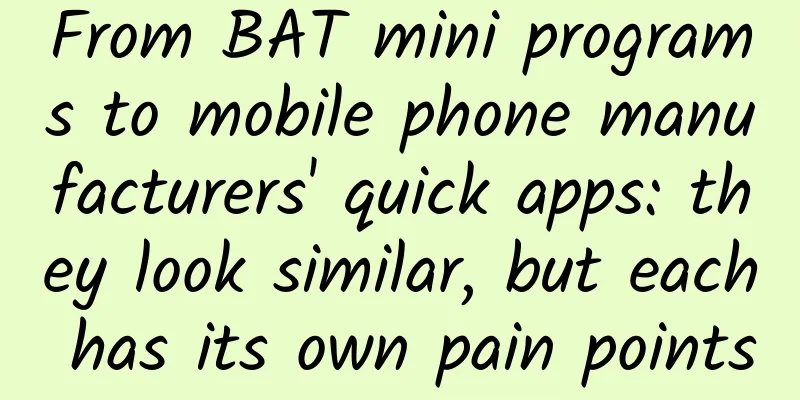From BAT mini programs to mobile phone manufacturers' quick apps: they look similar, but each has its own pain points

|
According to the 2018 first half report released by QuestMobile yesterday, WeChat Mini Programs have developed rapidly. As of June, there are nearly 1 million Mini Programs, and the largest "Weekend Shake" has reached 500 million MAU. WeChat officially launched its mini-programs in January 2017, which can be said to have seized the initiative. Soon after, Alipay also officially announced in August 2017 that its mini-programs had entered the public beta stage. At this time, Baidu, as a latecomer, still insisted on developing mini-programs despite the pressure of the failure of its young applications in 2013. A more dramatic scene occurred in March this year, when domestic mobile phone manufacturers Huawei, Xiaomi, ZTE, Lenovo and other competitors jointly launched "Quick Apps". The series of actions taken by these companies around mini programs are dazzling, and it is impossible not to delve into the substantive reasons behind the mini programs being so popular. As the dividends come to an end, the launch of mini programs is an inevitable trend 2018 is no longer the era of traffic, population, and content. Companies will shift their focus to building an ecosystem. At this time, the launch of mini programs is an inevitable trend. 1) The dividend has come to an end. According to the 2018 first half report released by QuestMobile yesterday, China's mobile Internet users only increased by 20 million in the first half of this year, and the total number has slowly increased to 1.1 billion. In the era of universal Internet access, the user scale is approaching the upper limit. According to Tencent's public data, the MAU in 2015, 2016, and 2017 were 697 million, 889 million, and 989 million, respectively. The growth rate has declined significantly, and the user growth is about to reach saturation. At this time, companies have to dig deep into user needs to cope with the current situation of the dividend ending, so they have launched mini programs one after another. 2) Building an ecological system. Mini programs play an important role in the ecological system that super platforms hope to build. The platform provides traffic entry for mini programs, and mini programs release their gravity, increase user stickiness, and provide users with a complete service experience, so that users can feel the integration of the platform. After that, they can realize monetization through payment to provide more convenience for developers. Building an ecological system in this way can thicken the barriers to competition and maximize benefits. 3) Mobile phone manufacturers are trying to protect themselves . Zhang Xiaolong once predicted that within the next two years, mini programs will replace 80% of the App market. Looking at the current popularity of the mini program market, Zhang Xiaolong's prediction may have come true, but it has undoubtedly affected some people. Mobile phone manufacturers who make their profits from advertising space in mobile malls are threatened by mini programs and have been forced to unite and launch quick apps. Bat applets and quick apps sound similar, but they actually have their own pain points Although BAT's mini programs and quick apps are similar applications, a detailed comparative analysis of them will reveal that the characteristics of each company are reflected in the mini programs. WeChat Mini Program: Traffic and social interaction are the biggest advantages: As the earliest mini program to be launched, according to the QuestMobile report, the number of daily active users of mini programs reached about 140 million in June 2018, with a penetration rate of 43.9%. This is due to WeChat's own huge user traffic and unique social capital. WeChat is the only one of the four that has a social platform. On this basis, Tencent also provides very good resources for mini programs. The homepage sliding mode, public account association, social forwarding and other channels have attracted developers to rush to join WeChat. Among them, Pinduoduo, whose market value is estimated to be 24 billion in its recent prospectus, is the most successful case of mini programs. However, WeChat is not without problems. Violation of the openness of the Internet: After WeChat launched mini-programs, it conflicted with existing external links. WeChat wanted to keep all traffic within its own system, and more and more external links could not be shared in WeChat, such as Kuaishou, Douyin, and Xigua Video. In the long run, it is inevitable that users and developers will be anxious. Just a while ago, the termination of cooperation between Douyin and WeChat caused a lot of controversy, and Douyin even published an article challenging WeChat. The article is titled "WeChat, thank you for your hard work! Friends, see you on Douyin", which records the process of Douyin being banned by WeChat and even the end of cooperation with WeChat. Damage to social relationships: Some developers take advantage of human weaknesses and encourage users to share mini-programs through interpersonal communication. For example, Pinduoduo’s forwarding to bargain, and the sharing of mini-games such as “Pirates Are Coming” and “Bounce” to “extend life”. This has aroused public disgust, and even many jokes and emoticons complaining about mini-programs have appeared. On the one hand, this is a damage to interpersonal communication, and on the other hand, it is also a damage to the WeChat ecosystem. WeChat has strong control, which makes developers too passive: not long ago, more than 2,000 mini-programs were banned by the government. Developers use WeChat's platform and have to adapt to changes in Tencent's policies at any time, and they have no control over it. Baidu Mini Program Search and openness have become Baidu's characteristics: Baidu APP currently has more than 150 million daily active users. As one of the best search engines, Baidu has a huge search capital. In addition, Baidu's information flow also provides an entrance. And Baidu's open ecological structure enables all of Baidu's offline products and cooperative apps to become the entrance to the mini program. These are the capital and advantages that Baidu has. At the same time, Baidu’s pain points cannot be avoided. Weak payment is a pain point, and developers have difficulty realizing cash: In terms of payment, Baidu's payment resources are completely unable to compete with Alipay and WeChat. In terms of market share, according to Analysys data, in Q1 2017, Baidu Wallet's market share was only 0.36%, while Alipay's share reached 53.7%. Weak payment means that the monetization needs of developers cannot be met. Once the monetization needs of developers cannot be met, more developers cannot be attracted, and then more services cannot be provided to users. Lack of social interaction and inability to spread secondary content: The current Baidu app lacks social interaction, and users do not share and therefore lack secondary content. Secondary content is dynamic, and multiple content transmissions can make the mini program spread out in a network, achieving multiple effects. At the same time, because social interaction can stimulate user retention, WeChat mini program users obviously stay longer, which has become a problem for Baidu. For now, Baidu only supports corporate registration and is not yet open to individuals. This will create threshold restrictions for developers, which is also something that needs to be considered. Alipay Mini Program The future integration potential of online traffic and offline resources: Alibaba announced its 2018 performance on May 4: As of March 31, 2018, the number of active users of Alipay worldwide was approximately 870 million. Huge online traffic can promote the development of mini programs. Offline resources are also an advantage of Alipay. According to the latest data, offline payments completed by Alipay account for 64.2% of the total national benefits. In the future, mini programs will also have the opportunity to integrate with offline resources. For example, when users use payment to scan codes offline, they can jump out of the mini program, and more physical merchants will enter the mini program. However, to this day, the Alipay mini program still seems lukewarm. On the one hand, Alipay has shortcomings in the social field. On the other hand, the traffic conversion rate is not high. The same problem Baidu faces is a lack of social networking: as early as 2016, Alipay launched two functions, Campus Diary and White-collar Diary, in an attempt to open up social networking, but they were later taken offline. The "Five Blessings" event and Ant Forest launched in recent years are both aimed at promoting social networking, but they have not reached the desired level, and social networking is still in short supply. Low traffic conversion rate: Alipay’s 870 million active users are comparable to WeChat. WeChat has Pinduoduo and Jump Jump as its successful cases, but no Alipay mini program has ever become popular. According to data from China International Capital Corporation, as of March 2017, the average daily usage time of WeChat, Dianping, and Weibo was about 81.5 minutes, about 10.5 minutes, and about 31.3 minutes, respectively, while the average daily usage time of Alipay, about 6.4 minutes, was relatively low. This situation has not changed by June 2018, and the total usage time of Baidu and Alibaba's series of applications has always been at a disadvantage. Alipay, as a functional product, is the exact opposite of a content product. The more successful a content product is, the longer users use it and the higher the traffic conversion rate is. However, the better and more practical a functional product is, the shorter the user stays and the lower the traffic conversion rate is. In terms of entrance, compared with the sliding mode of WeChat homepage, the resources provided by Alipay to mini programs are not comprehensive, and the folding entrance is deeper. At the same time, Baidu has the same problems as not being open to individuals, and Alipay also faces such difficulties. Quick App Mobile phone manufacturers provide user base: According to data released by QuestMobile in June, the user scale of the nine alliance manufacturers has reached more than 50% of the total scale of domestic smart terminal users, and their user base is still considerable. Non-transferability is a disadvantage: The shortcomings of quick applications that rely on mobile phone carriers are obvious. The first is its non-transferability, unlike bat accounts that can be transferred and saved on any device. There is no traffic: the entrance is folded three times, and the effect is greatly reduced. Not to mention that the quick app has neither social nor payment, and compared with bat, it is almost uncompetitive. User limitations, unable to reach Apple users: The nine major manufacturers are all domestic mobile phone manufacturers and have no way to reach Apple users. Previously, the US media "dazeinfo" website reported that there are as many as 200 million Apple mobile phone users in China, but fast apps are powerless to do anything about it. Conflict of interest with apps, and useless: Quick apps opened directly through the mobile store have, to a certain extent, conflicts of interest with apps in the mobile store through the same port. Not to mention that after the quick app creates a shortcut, it is on the same page as the app, which is inevitably useless for users. Social media and payment are the factors that influence the popularity of mini programs If we think carefully about the differences between BAT mini programs and quick apps, we can easily find that social networking plays a decisive role. Alipay has tried to do e-commerce many times, which on the one hand reflects the importance of social networking. On the other hand, it also indirectly shows that it is very difficult to do social networking well. Today, Tencent’s monopoly on social networking has basically been established, leaving few opportunities for Alibaba and Baidu. In addition to social networking, payment is also a relatively influential part, which is directly linked to the interests of developers. This is exactly the pain point of Baidu. However, just like social networking, WeChat and Alipay have a market share in the payment field, and Baidu is unlikely to intervene. The weakness of social networking and payment is the dilemma faced by mini programs, and it is also the disadvantage of Baidu and Alipay. However, WeChat, which has a huge advantage, also has its own problems. |
<<: What are the deep-seated product logics behind these 10 ineffective WeChat designs?
>>: Is iOS jailbreaking still your thing? Talking about iOS jailbreaking and its future
Recommend
Will German workers' wage increase affect the price in China? Tesla Model Y will increase its price by more than 10,000 yuan again
Tesla Model Y is a mid-size SUV under Tesla and o...
3 Case Studies to Help You Implement Growth Models (Part 1)
With the rapid development of the Internet , its ...
What are the benefits of having a high number of likes on Douyin? What is the function?
The most direct way for apps like Tik Tok , Kuais...
How to boost your immunity? Eat like a rainbow!
Written by: Li Caihong, Chief Nutrition Technicia...
Why do we need to use project thinking to attract new users?
What should you do when the KPI indicator is &quo...
Sad news: Fat people who exercise can only become a strong fat person
Spring is a season for losing weight. In order to...
What are the functions of home building materials mini program and how much does it cost to develop a building materials delivery mini program?
In recent days, we have received a lot of inquiri...
Baidu bidding promotion, why are the keywords I added not suitable for promotion?
When adding keywords under the Baidu bidding prom...
Wei An's 18 High-Paying Sales Lessons Audio
Wei An's 18 high-paying sales lessons audio, ...
Python Development: Introduction to Cache Mechanism
[51CTO Quick Translation] In today's article,...
Remdesivir clinical trial! What is remdesivir? What is the price?
As of February 7, a total of 31,214 cases of nove...
Did a 25-year-old boy develop a hemangioma from long-term nose picking? Don’t be afraid! But you really can’t pick your nose casually
In daily life, the nose sometimes produces reacti...
6 rules of brand marketing
Without successful marketing, there can be no suc...
7 common traits of effective programmers
Introduction: To be a great programmer, you need ...
Google apps now fully support dark mode on Android and iOS
Although Google introduced dark mode for its Andr...






![[Case] How to promote mobile medical APP in an embarrassing situation!](/upload/images/67cc3dc020041.webp)


